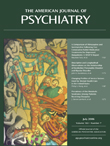To the Editor: The case we presented illustrates how nonevidence-based medical attitudes influenced opioid use in a chronic pain patient
(1) . In our experience, our study case is far from unique and, with increasing frequency, similar cases are being referred to psychiatrists after opioid dependence has been established. In our discussion, we reviewed the current evidence suggesting that chronic intake of high-dose opioids is neither effective nor safe in the treatment of persistent pain and that it likely enhances pain sensitivity in general.
Despite his acknowledgment of the latter, Dr. Abramson advocates a divergent approach toward opioid prescription for chronic pain. He describes a dichotomy to explain differences in chronic pain patients, implying that this dichotomy should determine whether high-dose opioids might be appropriate. He argues that one group of patients has “true” pain and therefore does not have drug-seeking behavior, and another group is prone to addictive behavior. This is consistent with the literature that distinguishes addiction from dependence, which implies that if a patient behaves well, maintenance opioid treatment is appropriate. In the case we presented, several physicians at different times, ranging from months to years, perceived the patient as physically dependent on opioids, but not addicted to them, and that high-dose opioids were necessary to control her pain. However, the complete, longitudinal course demonstrated the tragedy of this approach.
Advocacy of maintenance opioid treatment for dependent chronic pain patients but not for addicted pain patients is based on an underlying assumption: that the body’s response to chronic intake of opioids is similar to acute intake in that effective analgesia is maintained despite physical dependence. There is strong and growing evidence on clinical, experimental, and basic scientific grounds that this assumption is false
(2,
3) . Nevertheless, good functioning can be compatible with high-dose opioid intake, such as with methadone maintenance patients treated for heroin or other opioid addiction. Therefore, the fact that some chronic pain patients are capable of functioning relatively well on high-dose opioids for lengthy periods of time does not prove that opioid analgesia is responsible.
Dr. Abramson suggests that treatment involving detoxification is not likely to be beneficial for nondrug abusing patients with chronic nonmalignant pain who are maintained on high-dose opioids. We have found the opposite to be true, and so have others
(4) . Dr. Abramson expresses confidence that he can sort out a subset of patients who will benefit from opioid maintenance. This desirable ability is not common enough, judging from the epidemic of prescription opioid problems that has accompanied the liberal prescribing of recent years
(5) .

